ANNOUNCING MY NEW BOOK: A PERFECT GIFT BOOK FOR COLLEGE GRADUATES:
Serious Dreams: Bold Ideas for the Rest of Your Life (Square Halo Books) $13.99
There are phrases that keep coming to mind, as I sit here, fingers poised over the keyboard, phrases that we all know that should guide decent conversation in the polite ways of appropriate humility. One ought not “toot your own horn” or “pat yourself on the back”, let alone “sing your own praises.”
I don’t know quite how to get around this, though, as today, this is exactly my job.
Serious Dreams: Bold Ideas for the Rest of Your Life, the book that some of you have heard I’ve been working on this past year, was just released by the publisher this week. Obviously, we just had to tell you!
working on this past year, was just released by the publisher this week. Obviously, we just had to tell you!
Given that it was pretty much my idea — yep, it’s my little baby — and given that the publisher is a respected but small, indie press without a huge reach into the marketplace, and, given, too, that it was rushed to publication quickly, as I hoped, without much of a marketing plan, I guess it is evident that it is my job to let you know about it now.
Did I say this really is my baby? That Beth and I have been significantly involved with Square Halo Books to get this thing out their doors? That I think it is pretty amazing, even if it sounds impolite for me to say so? I’m blushing a bit, but I’m so excited to tell you all about it.
If ever there was a time when our dear BookNotes readers and Hearts & Minds fan base needs to know about something (something that they most likely won’t hear about anywhere else) this is it. So forgive me as I review my own work. It’s a little weird, I know, but bear with me: despite obvious bias and self-interest, I really do think you will want to know about this. Dare I say you need to know about this?
And that we need your help in spreading the news about this book for young adults, recent college grads, especially, inspiring them to live well, taking up serious dreams of God’s Kingdom coming.
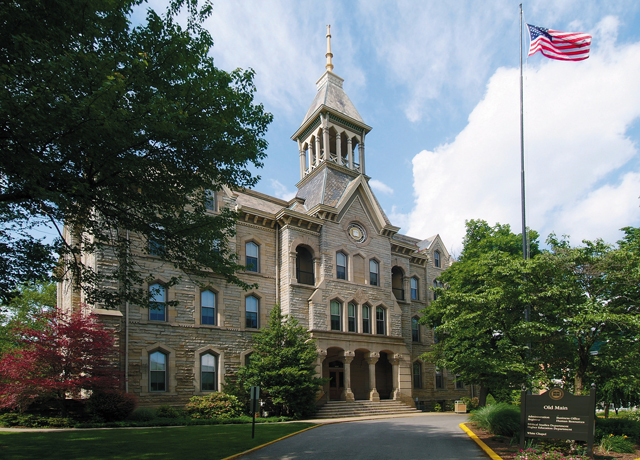 The shortest version of the backstory is that I was given the great privilege of delivering the commencement address for the Graduate School and Adult Learners at Geneva College in Beaver Falls, Pennsylvania, last spring. It was a thrilling event for Beth and me; associates there offered great support, the trustees awarded me an honorary doctorate, and even some out of state friends arrived to help celebrate. In that speech I talked a bit about the unique heritage of this Reformed Presbyterian college, its good legacy, their current conversations about the integration of faith and learning for the common good, and the future for recent grads, helping them
The shortest version of the backstory is that I was given the great privilege of delivering the commencement address for the Graduate School and Adult Learners at Geneva College in Beaver Falls, Pennsylvania, last spring. It was a thrilling event for Beth and me; associates there offered great support, the trustees awarded me an honorary doctorate, and even some out of state friends arrived to help celebrate. In that speech I talked a bit about the unique heritage of this Reformed Presbyterian college, its good legacy, their current conversations about the integration of faith and learning for the common good, and the future for recent grads, helping them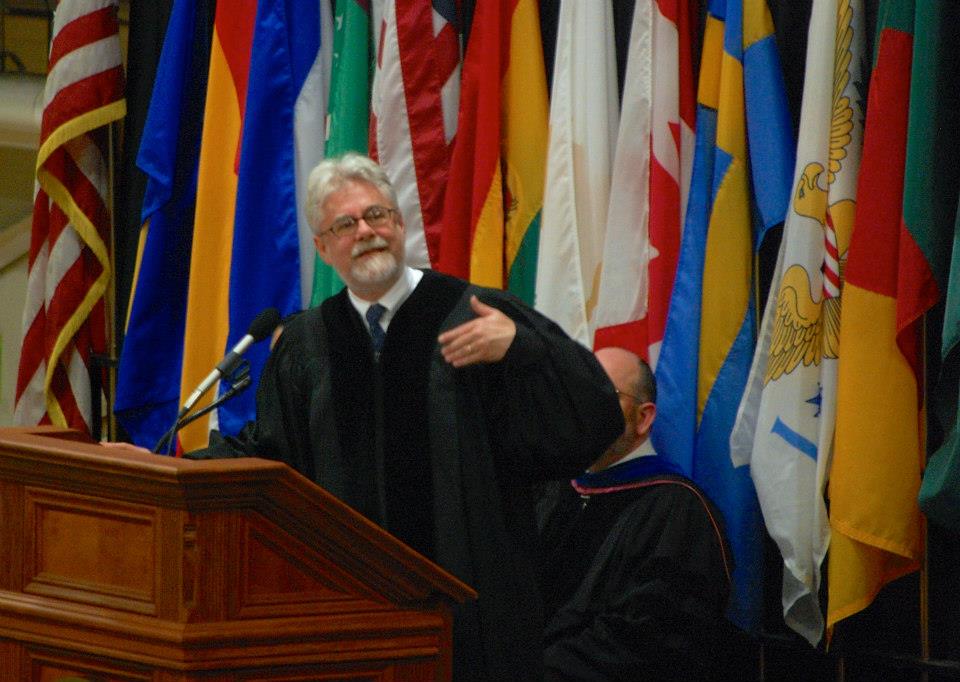
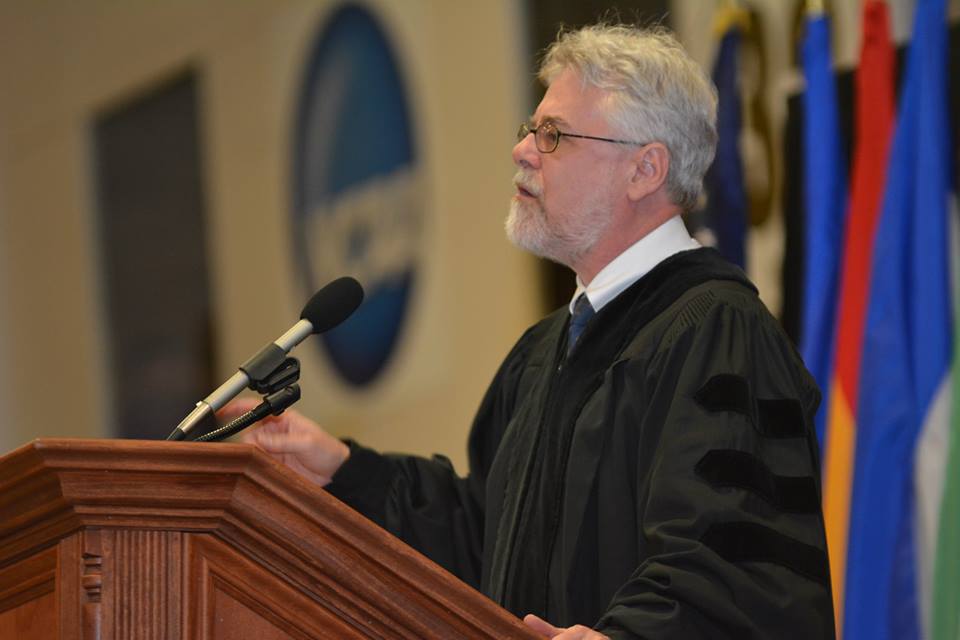 imagine the complex tasks of stepping into their vocations in the world, for the life of the world. I preached on a few favorite passages, told a few stories, and cried out to God and the gathered community, hoping that these talented young adults would help advance Christ’s Kingdom, especially in their various careers, jobs, workplaces. It got a pretty good response, for which I was humbled and grateful. A number of people asked if I might print it up, and we considered briefly doing a little booklet to share with those who had wanted to read it. Borger getting a free doctorate was quite the news for a bit — ha, ha – and we wanted to honor those who wanted to read my remarks.
imagine the complex tasks of stepping into their vocations in the world, for the life of the world. I preached on a few favorite passages, told a few stories, and cried out to God and the gathered community, hoping that these talented young adults would help advance Christ’s Kingdom, especially in their various careers, jobs, workplaces. It got a pretty good response, for which I was humbled and grateful. A number of people asked if I might print it up, and we considered briefly doing a little booklet to share with those who had wanted to read it. Borger getting a free doctorate was quite the news for a bit — ha, ha – and we wanted to honor those who wanted to read my remarks.
 A week or so later, I watched the commencement address at Calvin College in Grand Rapids, one delivered by then-Provost Dr. Claudia Beverslius, who built her marvelous speech around a beloved Wendell Berry poem, a funeral poem, actually. Mr. Berry has visited their campus on more than one occasion and it was more than appropriate to use his work, it was genius. With tears running down my cheeks in front of the live streaming video on Beth’s computer, I commented that that was a speech that deserved to be widely read.
A week or so later, I watched the commencement address at Calvin College in Grand Rapids, one delivered by then-Provost Dr. Claudia Beverslius, who built her marvelous speech around a beloved Wendell Berry poem, a funeral poem, actually. Mr. Berry has visited their campus on more than one occasion and it was more than appropriate to use his work, it was genius. With tears running down my cheeks in front of the live streaming video on Beth’s computer, I commented that that was a speech that deserved to be widely read.
And so I set out to find other friends of mine or authors I respected who had given graduation speeches for evangelical Christian colleges, speeches I could acquire easily, that had not been published in a book before, and that cohered around a common theme – taking up what Steve Garber calls “visions of vocation” and living out the implications of the gospel of the Kingdom in all of life, for the life of the world. Not a few speeches these days use the language of calling, finding purpose and meaning, making a difference, but I did not want any that were merely inspirational, without Biblical substance to inform the meaning of these grand rhetorical calls, and I wanted reflections that did not overstate the call to be radical, as if we are all called only to be revolutionaries changing the world, with unrealistic bluster. I wanted balance, substance, and talks that were beautifully crafted, well done, words that would last, bread for the journey as young adults make their way into the marketplace.
They didn’t need to be in the same theological tradition, exactly, but I wanted them to hold together, offering a certain sort of worldview and embodied practices, in the world, but not of it, for the sake of God’s glory and our neighbors good. And I found some great ones.
 Serious Dreams: Big Ideas… includes seven great messages and they all translate well from the spoken word format to the printed page. (I will write a bit about the adventure of editing these manuscripts, and why we left most of the talks mostly unedited, soon.) I think this small. compact sized book is not only a great gift for a graduating college young adult, but for anyone wanting to be reminded of the big picture of our call to follow Christ in all areas of life, living missionally for the reign of God, even in our work and careers.
Serious Dreams: Big Ideas… includes seven great messages and they all translate well from the spoken word format to the printed page. (I will write a bit about the adventure of editing these manuscripts, and why we left most of the talks mostly unedited, soon.) I think this small. compact sized book is not only a great gift for a graduating college young adult, but for anyone wanting to be reminded of the big picture of our call to follow Christ in all areas of life, living missionally for the reign of God, even in our work and careers.
I begin the book with a long, opening introduction that, we think, helps frame the ideas of the speeches. I admit that I like the breathy rhetoric of these upbeat messages, designed to inspire young professionals to enter the worlds of work and see their future destinations as venues for the redeeming work of God. I like the approach expressed in some of them, how our own life stories make most sense in light of God’s redemptive Story. My own speech in the book is pretty breathy and earnest about such things, maybe a bit fiery, even. But much of my introduction is a gentle reminder not to take these motivational sermons to mean that we have to “go far” or “make something of ourselves” as “world changers” or that we have to do big things to “transform the culture.” No — we can start small, live locally, be faithful even in baby steps as we live into this story, gain a sense of place, learn our craft, earn the right to be heard.
 In that introductory chapter, I mention authors like Wendell Berry and Eugene Peterson who remind us to find God in the down-to-Earth and mundane, even the rural and seemingly insignificant. Granted, some may be called to pretty glitzy careers in high-rise offices exploring remarkable careers, but most of us are not. I cite books like Jonathan Wilson Hartgrove’s The Wisdom of Stability: Rooting Faith in a Mobile Culture. Although most of the speakers do suggest it, I wanted to be clear: young adults transitioning out of college need both a big, transforming vision and a whole lot of patience; we need to be eager to make a difference in the culture, yes, but we also need good friends, a faithful church, good art, healthy food, helpful stores, enriching hobbies, maybe a bookseller friend or two, living slowly into what I explain as “common graces for the common good.” It is good to be involved in normal life, establishing sacred rhythms and living well, in ways that are not particularly extraordinary.
In that introductory chapter, I mention authors like Wendell Berry and Eugene Peterson who remind us to find God in the down-to-Earth and mundane, even the rural and seemingly insignificant. Granted, some may be called to pretty glitzy careers in high-rise offices exploring remarkable careers, but most of us are not. I cite books like Jonathan Wilson Hartgrove’s The Wisdom of Stability: Rooting Faith in a Mobile Culture. Although most of the speakers do suggest it, I wanted to be clear: young adults transitioning out of college need both a big, transforming vision and a whole lot of patience; we need to be eager to make a difference in the culture, yes, but we also need good friends, a faithful church, good art, healthy food, helpful stores, enriching hobbies, maybe a bookseller friend or two, living slowly into what I explain as “common graces for the common good.” It is good to be involved in normal life, establishing sacred rhythms and living well, in ways that are not particularly extraordinary.
I do not want to scare you away, but I also say in this framing introduction that we must also be prepared to suffer. I mention Henri Nouwen’s good phrase, saying we can be “wounded healers” and tell an Anne Lamotte story about hard times. I note that Nicholas Wolterstorff’s spectacular speech is about having “two eyes” – one to see what needs to be done, a technical eye for skills and competence and excellence, and the other with which to shed tears. I think this is liberating, good stuff, and it helps readers realize that although most of these speeches are motivational and encouraging, we do have to be prepared for the hardships of this life. I say it better in the book, but wanted you to know some of the themes of my opening chapter. It is called “Live Well, Do Good, Be True.”
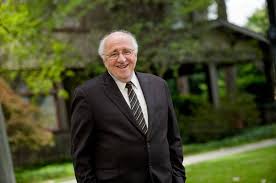 Richard Mouw‘s is the first real chapter. He a master of the short speech (in fact, he has a book of very short speeches published by Eerdmans that he compiled during his years at President of Fuller Theological Seminary, called Praying at Burger King. It’s great!) This commencement address, entitled “What It’s All About” was given last year near us here at Messiah College. It is a bit longer than those short ones, but it is concise and powerful. He starts with a splendid joke, talks about the significance of having been a collegiate learner, and reminds these soon-to-be-graduates of the importance of uniquely Christian scholarship, encouraging them to keep their minds sharp, and too look for ways to honor Christ even in the life of the mind. He tells a few moving stories about the clarity we need about the first things of the gospel, about the courage that is needed to live out faith in our complicated world. He ends with a rousing Bible reading; it is an inspiring ending of a very good chapter. I must say it is a real honor to have Rich in this little book; he is one of our favorite writers and thinkers these days and it’s a great lead chapter. His latest book, by the way, is a lovely little volume about some of these same themes and is entitled Called to the Life of the Mind.
Richard Mouw‘s is the first real chapter. He a master of the short speech (in fact, he has a book of very short speeches published by Eerdmans that he compiled during his years at President of Fuller Theological Seminary, called Praying at Burger King. It’s great!) This commencement address, entitled “What It’s All About” was given last year near us here at Messiah College. It is a bit longer than those short ones, but it is concise and powerful. He starts with a splendid joke, talks about the significance of having been a collegiate learner, and reminds these soon-to-be-graduates of the importance of uniquely Christian scholarship, encouraging them to keep their minds sharp, and too look for ways to honor Christ even in the life of the mind. He tells a few moving stories about the clarity we need about the first things of the gospel, about the courage that is needed to live out faith in our complicated world. He ends with a rousing Bible reading; it is an inspiring ending of a very good chapter. I must say it is a real honor to have Rich in this little book; he is one of our favorite writers and thinkers these days and it’s a great lead chapter. His latest book, by the way, is a lovely little volume about some of these same themes and is entitled Called to the Life of the Mind.
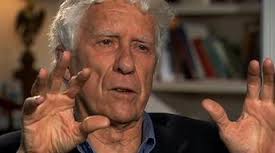 Mouw’s old friend, himself a renowned political philosopher and renowned scholar, Nicholas Wolterstorff, Professor Emeritus at Yale, has one of the most brilliantly conceived pieces in the book. Nick explains as a philosopher can, the nuances of what good Christian thinking entails, and he, like Mouw, extols the good learning skills acquired in (Christian) higher education, reminding the young adults to continue to think well, calling them to challenge the ways things are, probing the deeper meaning of things they encounter, even in their future workplaces and institutions. But the heart of his talk comes from story about an obstetrician who once advised health care providers among those who experience the death of a newborn to have “two eyes – one to watch the IV, the other to weep with the bereaved parents.” And from there, Wolterstorff asks what it would mean for businesspeople or teachers or lawyers or engineers or workers in any career to have two eyes, seeing competence and compassion, skill-sets and excellence as well as the ability to weep with those who weep. In fact, he suggested, if one is attuned to the suffering in any given arena of life, it is more likely that one will want to use her skills to bring reform and change in their profession so that those who are hurting might see justice. (And, conversely, even if a young professional is truly skilled, without the eye that sheds tears, she may not realize what might be wrong in the place she works, and her skill becomes mere technical competence, not Christian service.) Over and over, the famed professor shows that we need two eyes. That is, he explains with great clarity and beautifully crisp sentences why we need “head and heart” – two eyes. It is an amazing speech and well worth pondering, even worth the price of the book for us all.
Mouw’s old friend, himself a renowned political philosopher and renowned scholar, Nicholas Wolterstorff, Professor Emeritus at Yale, has one of the most brilliantly conceived pieces in the book. Nick explains as a philosopher can, the nuances of what good Christian thinking entails, and he, like Mouw, extols the good learning skills acquired in (Christian) higher education, reminding the young adults to continue to think well, calling them to challenge the ways things are, probing the deeper meaning of things they encounter, even in their future workplaces and institutions. But the heart of his talk comes from story about an obstetrician who once advised health care providers among those who experience the death of a newborn to have “two eyes – one to watch the IV, the other to weep with the bereaved parents.” And from there, Wolterstorff asks what it would mean for businesspeople or teachers or lawyers or engineers or workers in any career to have two eyes, seeing competence and compassion, skill-sets and excellence as well as the ability to weep with those who weep. In fact, he suggested, if one is attuned to the suffering in any given arena of life, it is more likely that one will want to use her skills to bring reform and change in their profession so that those who are hurting might see justice. (And, conversely, even if a young professional is truly skilled, without the eye that sheds tears, she may not realize what might be wrong in the place she works, and her skill becomes mere technical competence, not Christian service.) Over and over, the famed professor shows that we need two eyes. That is, he explains with great clarity and beautifully crisp sentences why we need “head and heart” – two eyes. It is an amazing speech and well worth pondering, even worth the price of the book for us all.
 The third chapter is another brilliant contribution, a concise and clear sermon on one passage of the Bible that will open up new vistas of understanding, create hope and energy for seeing one’s life and work as a ministry for the common good, in the public square. Dr. Amy Sherman delivered this talk called “Rejoicing Your Community” (inspired by Proverbs 11:10) at Malone University in Ohio, and, again, I would be glad to give this speech to anyone wanting to deepen their understanding of what we mean by stewarding one’s career in ways that serve others. Few have thought very explicitly about this, let alone heard a
The third chapter is another brilliant contribution, a concise and clear sermon on one passage of the Bible that will open up new vistas of understanding, create hope and energy for seeing one’s life and work as a ministry for the common good, in the public square. Dr. Amy Sherman delivered this talk called “Rejoicing Your Community” (inspired by Proverbs 11:10) at Malone University in Ohio, and, again, I would be glad to give this speech to anyone wanting to deepen their understanding of what we mean by stewarding one’s career in ways that serve others. Few have thought very explicitly about this, let alone heard a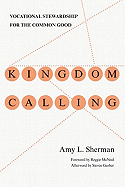 whole talk about it, but the text which Dr. Sherman explores says that the whole city will rejoice when “the righteous prosper.” Rather than producing resentment (which would be understandable, the have-nots frustrated with the haves, so to speak) those who perhaps are not prospering will be gladly rejoicing if God’s righteous ones are successful in ways that cause the healthy flourishing for all. That is, the city rejoices because, precisely, the tsaddiqim are not in it for themselves. Their prosperity apparently is a blessing to others, and develops because of, and is bound up with, the good of the city in which they live.
whole talk about it, but the text which Dr. Sherman explores says that the whole city will rejoice when “the righteous prosper.” Rather than producing resentment (which would be understandable, the have-nots frustrated with the haves, so to speak) those who perhaps are not prospering will be gladly rejoicing if God’s righteous ones are successful in ways that cause the healthy flourishing for all. That is, the city rejoices because, precisely, the tsaddiqim are not in it for themselves. Their prosperity apparently is a blessing to others, and develops because of, and is bound up with, the good of the city in which they live.
Her examples and questions about how to leverage one’s professional skills and passions for the common good is exactly the kind of speech (she lifts up as examples a few Malone alum who are doing good work) I wanted to find for this little volume, and we are glad Amy graced us with her good manuscript. For those wanting a fuller explication of this good idea, do see her significant Kingdom Calling: Vocational Stewardship for the Common Good (InterVarsity Press.)
 The next chapter is the one I have mentioned by Dr. Claudia Berversluis, the one that draws on a poem by Wendell Berry, “The Memory in the Seed.” Not only does she artfully use his insight about the relationship of the past to the future – seeds have been planted in the stuff learned at college, in the reading and learning in the classroom and in other places and ways, too – and they will be paid forward into the future. Perhaps it is because I have a daughter at Calvin College, and have very dear friends who work there, but this wonderful talk was the one that inspired me to do this book, and it is a very, very, good address. I have read it a dozen times, now, and do not tire of its inspiration, feeling her care for the graduating students and her hopeful confidence in the scope and broad vision of God’s Kingdom coming, even in hard times. I commend it to you, I really do.
The next chapter is the one I have mentioned by Dr. Claudia Berversluis, the one that draws on a poem by Wendell Berry, “The Memory in the Seed.” Not only does she artfully use his insight about the relationship of the past to the future – seeds have been planted in the stuff learned at college, in the reading and learning in the classroom and in other places and ways, too – and they will be paid forward into the future. Perhaps it is because I have a daughter at Calvin College, and have very dear friends who work there, but this wonderful talk was the one that inspired me to do this book, and it is a very, very, good address. I have read it a dozen times, now, and do not tire of its inspiration, feeling her care for the graduating students and her hopeful confidence in the scope and broad vision of God’s Kingdom coming, even in hard times. I commend it to you, I really do.
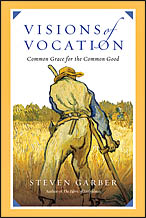
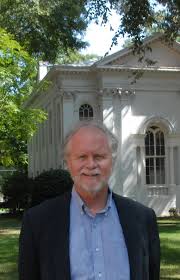 I perhaps don’t need to say too much about the fifth chapter other than to say it is an elegant rendering by Steve Garber, a dear friend and respected leader, especially on issues of the relationship of faith and work. Again, when I felt led to do this project, I knew I would insist on having his work represented; a book like this just had to have him in it, and we are grateful for his eager support. You may know his good efforts through his Washington Institute on Faith, Vocation and Culture. Perhaps you will recall his extraordinary book about living in the post-college years, Fabric of Faithfulness: Weaving Together Belief and Behavior, which was a much-discussed book a few years back, and still very, very worth of your attention. I hope you know his newer, award- winning book Visions of Vocation: Common Grace for the Common Good. In this talk – which was delivered last year to the graduating class of seminarians at Covenant Seminary in St. Louis, Missouri – Steve explores the notion that covenant could be an essential insight to understanding the nature of the world God has made, which he calls, sounding almost like Francis Schaeffer, a “covenantal cosmos.” Garber brings Wendell Berry into the conversation, mentions his own work consulting with large corporations and nonprofit ministries to help explore the way a covenantal understanding of knowing the world could bring healing and hope and hints of reformation in these troubled times. By using words like mutuality and responsibility, Steve models an allusive and profound language, and invites his listeners to learn how to speak about solid Biblical truths in ways that that unchurched and unfamiliar might understand and be drawn towards.
I perhaps don’t need to say too much about the fifth chapter other than to say it is an elegant rendering by Steve Garber, a dear friend and respected leader, especially on issues of the relationship of faith and work. Again, when I felt led to do this project, I knew I would insist on having his work represented; a book like this just had to have him in it, and we are grateful for his eager support. You may know his good efforts through his Washington Institute on Faith, Vocation and Culture. Perhaps you will recall his extraordinary book about living in the post-college years, Fabric of Faithfulness: Weaving Together Belief and Behavior, which was a much-discussed book a few years back, and still very, very worth of your attention. I hope you know his newer, award- winning book Visions of Vocation: Common Grace for the Common Good. In this talk – which was delivered last year to the graduating class of seminarians at Covenant Seminary in St. Louis, Missouri – Steve explores the notion that covenant could be an essential insight to understanding the nature of the world God has made, which he calls, sounding almost like Francis Schaeffer, a “covenantal cosmos.” Garber brings Wendell Berry into the conversation, mentions his own work consulting with large corporations and nonprofit ministries to help explore the way a covenantal understanding of knowing the world could bring healing and hope and hints of reformation in these troubled times. By using words like mutuality and responsibility, Steve models an allusive and profound language, and invites his listeners to learn how to speak about solid Biblical truths in ways that that unchurched and unfamiliar might understand and be drawn towards.
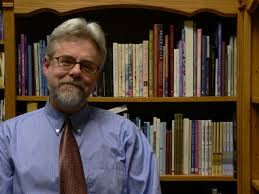 My chapter — Byron K. Borger of Hearts & Minds, for the record — follows Steve’s and if his is the most profound in the book, mine is perhaps the liveliest. As I will explain elsewhere, it was tricky cutting a bit out that perhaps worked in the live setting, but seemed less compelling as read on the printed page. In the original speech I made a number of comments about the college itself, and a former teacher there (Dr. Peter J. Steen) and I took some of those lines out, trimming the wordy text down to a more manageable contribution. (Mine is still the longest in the book — “two speeches for the price of one” one wit quipped. Imagine!) I suppose you know I can get a bit flamboyant at times, and I hope the passion in this talk shines through. Even if I countered it a bit with the calm reminders in the introduction to live small and local, I do share some pretty big ideas in this bold chapter.
My chapter — Byron K. Borger of Hearts & Minds, for the record — follows Steve’s and if his is the most profound in the book, mine is perhaps the liveliest. As I will explain elsewhere, it was tricky cutting a bit out that perhaps worked in the live setting, but seemed less compelling as read on the printed page. In the original speech I made a number of comments about the college itself, and a former teacher there (Dr. Peter J. Steen) and I took some of those lines out, trimming the wordy text down to a more manageable contribution. (Mine is still the longest in the book — “two speeches for the price of one” one wit quipped. Imagine!) I suppose you know I can get a bit flamboyant at times, and I hope the passion in this talk shines through. Even if I countered it a bit with the calm reminders in the introduction to live small and local, I do share some pretty big ideas in this bold chapter.
I wear my heart on my sleeve, there, friends, and I hope you enjoy hearing me share this visionary stuff that I believe with all my being. My message is called “Three Cheers for Sons and Daughters of Issachar” which alludes to the reputation of the group mentioned in 1 Chronicles 12:32 – who “understood the times and knew what God’s people should do.” Oh, if we had more sons and daughters of Issachar, who read the world and read the Word with faithful clarity and big-hearted passion, becoming wise leaders for change, ambassadors of the Kingdom coming, life-long learners willing to critique the culture and offer winsome solutions. Maybe this chapter will stimulate someone some-where to live more robustly for Christ’s ways, prepared even to suffer for His sake, like Issacharians. I’d be eager to hear what you think.
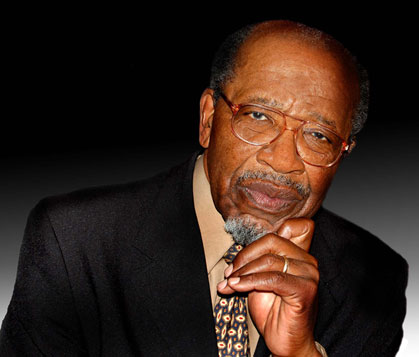 The last commencement speech in the book was given by the famous civil rights leader Dr. John M. Perkins, who preached up a storm at Seattle Pacific University’s graduation ceremony a few years ago. We really wanted to have Dr. Perkins included as he has been a real hero to many of us, and we have crossed paths many a time over the years, most notably at the big Jubilee conference in Pittsburgh. Many of the students affiliated with the CCO who attend Jubilee may know him, and those that do not, certainly should. He is a prolific author and vibrant leader for evangelical faith that is deeply committed to racial reconciliation, social justice, and leadership development, especially among those who are hurting and marginalized. Perkins and his ministry offers a model of radical, prophetic
The last commencement speech in the book was given by the famous civil rights leader Dr. John M. Perkins, who preached up a storm at Seattle Pacific University’s graduation ceremony a few years ago. We really wanted to have Dr. Perkins included as he has been a real hero to many of us, and we have crossed paths many a time over the years, most notably at the big Jubilee conference in Pittsburgh. Many of the students affiliated with the CCO who attend Jubilee may know him, and those that do not, certainly should. He is a prolific author and vibrant leader for evangelical faith that is deeply committed to racial reconciliation, social justice, and leadership development, especially among those who are hurting and marginalized. Perkins and his ministry offers a model of radical, prophetic 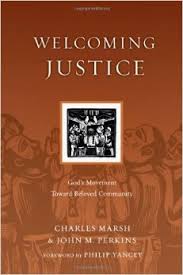 imagination and gospel-centered, evangelical faith.
imagination and gospel-centered, evangelical faith.
This wholistic, but evangelical piety comes out nicely in his speech here, inviting us all to be on “three roads” with Jesus. He tells about the Damascus Road (where Paul was transformed by a saving relationship with Christ), the Emmaus Road (where one walks with Christ, nurturing a spiritual friendship with Him, learning of His ways in the Scriptures) and the Jericho Road – the road of service. Of course, he naturally goes into this “three rs” as well, as a strategy for effective change on that Jericho Road, but the heart of this passionate call to action is based on these three roads. It seemed like a lively enough speech to put at the end of Serious Dreams and it reads well, as a good sermon in the black tradition should.
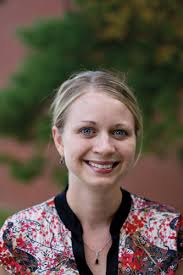 Erica Young Reitz offers a great afterward, an epilogue, really, and it is an integral part of the book. Erica is one of the best campus ministers I know, working for the CCO through a church in State College, PA (home of Penn State.) Year after year she has paid special attention to her young friends who were college seniors, walking with them through that year of transition, and then doing some teaching and services around the post-college experience. (She has done a workshop on this at the Jubilee conference, too, for seniors, to great acclaim.) Erica has a book coming out next year, tentatively titled Life After College (on InterVarsity Press) which tells of her work and offers practical guidance for Christian discipleship in the post-college years, so it is fantastic to have her included here. (The only other book like this, by the way, which we heartily recommend, is by Richard Lamb, called Following Jesus in the “Real World.”) Erica’s Young Reitz’s words at the end of this book gives it a bit more of a practical feel, offering clear guidance that is down to earth and helpful. I trust, also, that it will whet your appetite for her full book when it releases perhaps a year from now.
Erica Young Reitz offers a great afterward, an epilogue, really, and it is an integral part of the book. Erica is one of the best campus ministers I know, working for the CCO through a church in State College, PA (home of Penn State.) Year after year she has paid special attention to her young friends who were college seniors, walking with them through that year of transition, and then doing some teaching and services around the post-college experience. (She has done a workshop on this at the Jubilee conference, too, for seniors, to great acclaim.) Erica has a book coming out next year, tentatively titled Life After College (on InterVarsity Press) which tells of her work and offers practical guidance for Christian discipleship in the post-college years, so it is fantastic to have her included here. (The only other book like this, by the way, which we heartily recommend, is by Richard Lamb, called Following Jesus in the “Real World.”) Erica’s Young Reitz’s words at the end of this book gives it a bit more of a practical feel, offering clear guidance that is down to earth and helpful. I trust, also, that it will whet your appetite for her full book when it releases perhaps a year from now.
So, there it is, my description of the book I compiled and edited and now get to sell, before anywhere else.
I hope you realize that as odd as it is to be tooting my own horn, I am so, so eager to get this little volume launched into the world. We think it is so inspiring, and the authors each of such quality, that you may just want to have it, even if you graduated from college years ago, or perhaps never went to college. The talks are highly motivational, yet, well, serious; the insights, although concise and accessible, are really pretty profound — not the kind of stuff you hear every day. These are learned and smart folks, so the writing is good. As I describe below, it is a handsome, compact volume, with some very nice touches (including a brief reflective question or two at the end of each chapter to help readers process the content.) I’d be grateful and honored if you picked it up from us.
Even if you do want one for yourself — and I hope you do — please do think of this as a great gift for any young adults who have graduated in recent years.
Although these fine speeches were given at Christian colleges the primary intended audience includes anyone who has recently graduated from any kind of school who may appreciate the encouragement and guidance. Perhaps you’d be so kind as to suggest that your church buy a batch so they can honor their college graduates, inviting them to dream Serious Dreams.

BookNotes
SPECIAL
DISCOUNT
Serious Dreams: Bold Ideas for the Rest of Your Life
regularly $13.95
sale price
20% OFF
$11.16
order here
takes you to the secure Hearts & Minds order form page
just tell us what you want
inquire here
if you have questions or need more information
just ask us what you want to know
Hearts & Minds 234 East Main Street Dallastown, PA 17313 717-246-3333
